|
Presidential stakes 1988:
1989 election amidst JVP terror
by W.T.A. Leslie Fernando
A significant event in the first half of 1980s was the formation of
the Sri Lanka Mahajana Party led by Vijaya Kumaratunga on January 24,
1984. At the 1982 Presidential election Vijaya Kumaratunga
wholeheartedly supported Hector Kobbekaduwa amidst a conspiracy by some
front-rankers of the SLFP itself to defeat him. Later Maithripala
Senanayaka faction, which had, at the Presidential election and
Referendum supported J.R. Jayawardena was taken back to the SLFP. Soon
there were conflicts in the SLFP and a fraction led by Vijaya
Kumaratunga, T.B. Illangaratne and V.W. Kularatne left the party and
formed the SLMP.
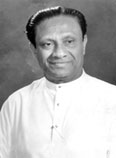 |
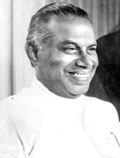 |
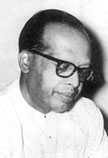 |
 |
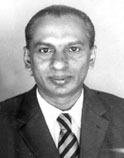 |
|
R. Premadasa |
S. Thondaman
|
T.B.
Illangaratne |
Vijaya
Kumaratunga |
V.W.
Kularatne |
The Sri Lanka Mahajana Party posed a threat to the SLFP at the by
elections held for Minneriya and Udunuwara held in 1984. Although Vijaya
Kumaratunga became a Buddhist, after marrying Chandrika Bandaranaike,
yet as the leader of the SLMP he maintained a close connection with the
Catholic Church.
Vijaya developed a cordiality with the LTTE too and when he visited
Jaffna he was given a hero's welcome by the LTTE. In this situation both
T. B. Illangaratne and V.W. Kularatne left the SLMP - after a while. The
JVP accused Vijaya Kumaratunga as "A loyal crony of J.R. Jayawardene who
embraced Eelam terrorist murderers."
Curfew
When the 1987 Indo-Lanka Accord was signed, opposition erupted
against it from all directions. Gamani Jayasuriya, the Minister of
Health in the UNP government resigned from the portfolio in protest. It
was vehemently opposed by the SLFP, MEP and the JVP and the Maha Sangha.
People took to streets against it and although the government imposed
a curfew, it could not quell the riotous atmosphere.
The government was forced to summon the Forces engaged in North and
East to bring the situation under control. Under these circumstances on
the request of J. R. Jayawardene, the Indian Peace Keeping Force was
deployed in North and the East in accordance with the Indo-Lanka Accord.
Before long the LTTE began to violate the Indo-Lanka Accord. It did
not endorse the Accord from the beginning, and Prabhakaran issued a
statement later that it had to give into the Accord due to pressure from
India. After violating the Accord, the LTTE became an enemy of the
Indian Central government.
Now the war between the Sri Lankan forces and the LTTE turned out to
be a battle between the IPKF and the LTTE.
Although there were protests all over the country against the 1987
Indo-Lanka Peace Accord, it also resulted in some significant changes in
the political environment in Sri Lanka.
The armed groups like PLOTE, TELO, EPRLF and EROS gave up their
terrorist activities and entered the democratic stream. The Leftist
parties, the LSSP, CP, NLSSP and the SLMP extended their full support to
the government to implement the Indo- Lanka Accord.
Accord
On the other hand in the background of the popular opposition to the
Accord, the JVP began to expand its armed activities. They interpreted
the Accord as a step in the direction of the Indian expansion they have
been always emphasising.
On August 18, 1987, the JVP directed a bomb attack at a meeting of
the government members presided by J. R. Jayawardene in the Parliament
building. The MP for Deniyaya, Keerthi Abeywickrema died in the attack
and Lalith Athulathmudali was seriously wounded.
Thereafter, government politicians, provincial leaders, activists of
the Jathika Sevaka Sangamaya, high officials in media institutions and
corporations and activists of the Conventional Leftist parties became
the target of the JVP and were assassinated. The students were mobilised
under the slogan "First the motherland and second the education" and
there were boycott of classes and so many demonstrations.
The Universities could not function for three years and the schools
too were closed for a long time.
At this time the SLMP led by Vijaya Kumaratunga turned towards the
traditional Leftist parties like the LSSP, CP (Moscow Wing) and the
NLSSP. When they were to form a united front, Vijaya Kumaratunga was
assassinated on February 15, 1988. However they formed the United
Socialist Alliance before his dead body.
The SLFP and the MEP protested against the provincial councils formed
under the Indo-Lanka Accord and did not contest the provincial council
elections held in 1988. The United Socialist Alliance contested all the
provincial councils except the North-East and the USA became the main
opposition in them. The EPRLF won the North-East in the elections held
in November 1988.
Hartal
The JVP terror further increased by the middle of 1988. For the first
anniversary of the Indo-Lanka Accord, the JVP declared a protest and
organised a Hartal for July 29 and 30. Heavy penalties were imposed on
those who did not participate in it.
The Hartal was somewhat a success and thereafter such Hartals were
imposed now and then. They were informed just on a piece of paper and
all the activities came to a stand still the moment the orders were put
out.
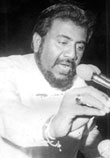 |
 |
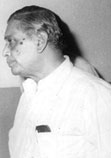 |
 |
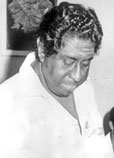 |
|
Ossie
Abeygunasekra |
M. H.
M. Ashraff |
Gamani
Jayasuriya |
Keerthi
Abeywickrema |
Kumar
Ponnambalam |
By the end of 1988, the situation in the country took a dangerous
turn and there was a complete breakdown in civil administration.
It was in this situation that the 1988 Presidential elections was
held. R. Premadasa from the UNP, Mrs. Sirimavo Bandaranaike of the SLFP
and Ossie Abeygunasekera the USA nominee contested the Presidential
stakes.
R. Premadasa got the support of the Workers' Congress led by S.
Thondaman and the Sri Lanka Muslim Congress led by M. H. M. Ashraff.
The MEP backed Mrs. Sirimavo Bandaranaike and the presence of Kumar
Ponnambalam the leader of the Tamil Congress too in her election
platform was very significant.
As the Presidential election was approaching terrorism began to reign
supreme in the country. In many places political activists were
assassinated. At first this terror was unleashed at the UNP and the USA
but later it was extended to the SLFP as well. In areas where there were
political meetings an unofficial curfew wad imposed by the JVP.
The opening rally of the USA at Kosgas junction was attacked. There
was a bomb attack at the USA meeting at Kadawatha and Deva Bandara a
Vice-President of the USA was killed. Even the UNP meetings were devoid
of crowds because of the threats of the JVP. Although the SLFP and the
USA were adversely affected the UNP was placed in a better position as
they could carry on their activities with the protection of the Police
and the Army.
Atmosphere
The 1988 Presidential election was held in a very frightening
atmosphere. The JVP threatened all those who would step out to vote,
with death. On the day of the election there were bomb explosions in
some polling booths, to instil fear among the voters. In some places
election officers were assassinated. As a whole there was no background
conducive to free exercise of vote. However, amidst all the threats
55.32% of voters in the country voted at the election.In this election
R. Premadasa of the UNP polled 50.4% of the total votes polled and was
elected the President.
Mrs. Sirimavo Bandaranaike from the SLFP polled 44.9% of the votes.
Ossie Abeygunasekra of the USA polled only 4.63%. The Presidential
election was held after 11 years of the UNP rule and the government was
not that popular. Mrs. Bandaranaike had a chance of winning. But the
things had worked the other way.
As R. Premadasa got the support of the CWC and the SLMC, he got most
of the minority votes. His pledges to alleviate poverty was very
attractive. His opposition to the Indo-Lanka accord too was advantageous
to him. Besides the UNP could turn the terror unleashed by the JVP to
its benefit by making use of the State power.
Although the candidate of the USA got only 4.63% of the votes, it
could eat into the votes of the SLFP. Besides the split in the anti -
UNP forces was a drawback to the SLFP campaign. It was clear from this
election too that the conventional left parties in Sri Lanka could not
stand on their own.
President J. R. Jayewardena dissolved the Parliament on December 20
1988 and called for nominations.
Thereafter there was a lull in terrorist activities for a few weeks
and the emergency too was lifted. There was a rumour that R. Premadasa
had some understanding with the JVP. However when the 1989 election
approached terrorist activities were resumed.There were some bomb
attacks at political meetings, some candidates and their supporters were
assassinated and those who disobeyed the orders of the JVP were killed.
Placards
Killings after the first two months of the Presidential election
exceeded 600. When the election campaign began some offices of both the
UNP and the SLFP, were destroyed by bomb attacks. 14 candidates were
assassinated. Out of them 9 were from the SLFP, 4 USA and one belonged
to the Tamil Congress. Strangely none of the UNP candidates was killed.
Couple of days before the election Deshapremi Sannaddha Balakaya
banned it and declared an unofficial curfew. There were some dead bodies
near some polling booths and in some others placards were displayed
threatening with death to the first 5 who would exercise the vote. 84
were killed within 24 hours before election day. Nevertheless with all
those threats the percentage that voted increased from 55.32 at the
Presidential election to 63.60 at the general election.
There were also stories that some terrorist activities were done by
the agents of governments under the cover of the JVP. There was a
suspicion the terror directed to the SLFP were caused by Green Tigers.
The latter revelation by the former DIG Premadasa Udugampola
substantiated this suspicion. It was also confirmed by the report of the
election commissioner.
Armed groups
In this general election held for the first time under the
proportional representation system on February 15, 1989, the UNP polled
50.7% of the votes and returned to power with 125 members. The SLFP
polled 31.9% of votes and won 67 seats.
At the Presidential election the SLFP got 44.9% of total votes polled
and this time the percentage came down. Holding the election after the
UNP victory at the Presidential election, meeting the terror of the JVP
with the help of State power, government forces and other private armed
groups is said to have led to the UNP victory.
The United Socialist Alliance polled only 2.9% of the vote and it
could win only 02 seats - one from Kegalle and the other from Ratnapura
Districts is Sabaragamuwa.
The MEP got only 1.6 % of votes and could win 02 seats from the
Colombo district. The MEP contested alone but the USA was a combination
of 04 parties the LSSP, CP, SLMP and the NLSSP. |

